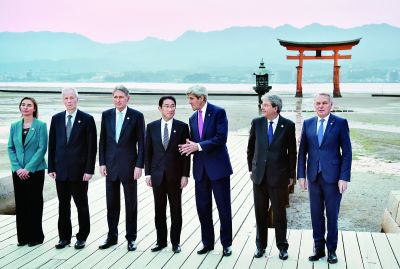By Victor Zhikai Gao, Chairman, China Energy Security Institute
On April 11, the G7 foreign ministers meeting in Hiroshima, Japan, issued a statement expressing concern over the East China Sea and South China Sea, and calling for international law to maintain maritime order, while expressing opposition to changing the status quo and aggravating tensions.

Although the statement did not name names, Beijing sees it as a provocation. In recent decades, there had been no problem with freedom of navigation and overflight in the East China Sea or South China Sea. Any allegations of China's threat to maritime security in the region are false.
As the world's largest trading nation, China attaches much importance to maintain maritime navigation and civil aviation security. In this part of the world, China has the longest-living civilization and has long-running historical records, many of which contain evidence of Chinese sovereignty and territorial possession of the islands, atolls and reefs in the East China Sea and South China Sea.
As one of the victor nations of World War II., with which Japan had signed an unconditional surrender, China had reclaimed all the islands, atolls and reefs in the South China Sea. As far as the Diaoyu Islands are concerned, even the United States does not recognize Japanese sovereignty, since Chinese sovereignty over the Diaoyu Islands can be traced back to the Cairo Declaration and Potsdam Declaration.
China has territorial disputes with Vietnam and the Philippines, in the South China Sea as well. The Philippine's territorial boundary is well defined by several international treaties (between the US and Spain at the end of the American-Spanish War). Beijing will not permit Manila to reach out beyond its well-recognized territorial boundary in the South China Sea.
The Vietnamese government in the 1950s issued an official statement recognizing Chinese sovereignty in the Xisha Islands in the South China Sea, and Beijing will not permit Hanoi to negate its commitment.
The G7 Foreign Ministerial Meeting could have adopted an objective attitude and urged relevant parties involved in territorial disputes in the South China Sea and East China Sea to use diplomacy to resolve their differences.
By picking sides, G7 Foreign Ministers are not acting helpful and have failed to facilitate a peaceful solution. G7 Foreign Ministers have complicated the situation further, and strengthened the resolve of the Chinese government and Chinese people to stand firm over Chinese sovereignty and territorial integrity.
No one should underestimate the resolve of 1.38 billion Chinese citizens standing united behind Beijing to defend Chinese territories. Beijing does not want to have an inch of land that is not China's, but will not give up any inch of land which is China's.
Beijing seeks peaceful negotiations. China will not allow itself to be coerced by any force in the world, including the G7 Foreign Ministerial Statement, to compromise its sovereignty and territorial integrity in the East China Sea and South China Sea.
Let's give diplomacy a chance. Let's give peaceful negotiations a chance. Let's see through the double standards of the G7 Foreign Ministerial Statement. Let's guard against any attempt to exploit these territorial disputes to advance the agendas of outsiders.
( The opinions expressed here do not necessarily reflect the opinions of Panview or CCTV.com. )

Panview offers an alternative angle on China and the rest of the world through the analyses and opinions of experts. We also welcome outside submissions, so feel free to send in your own editorials to "globalopinion@vip.cntv.cn" for consideration.















